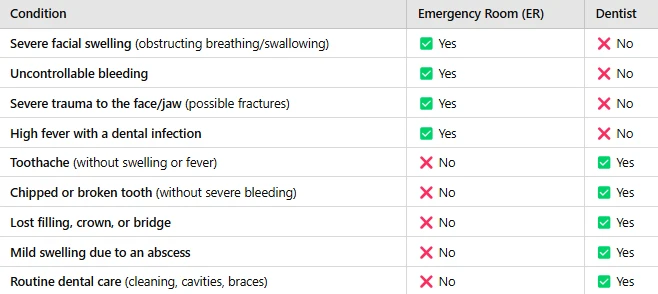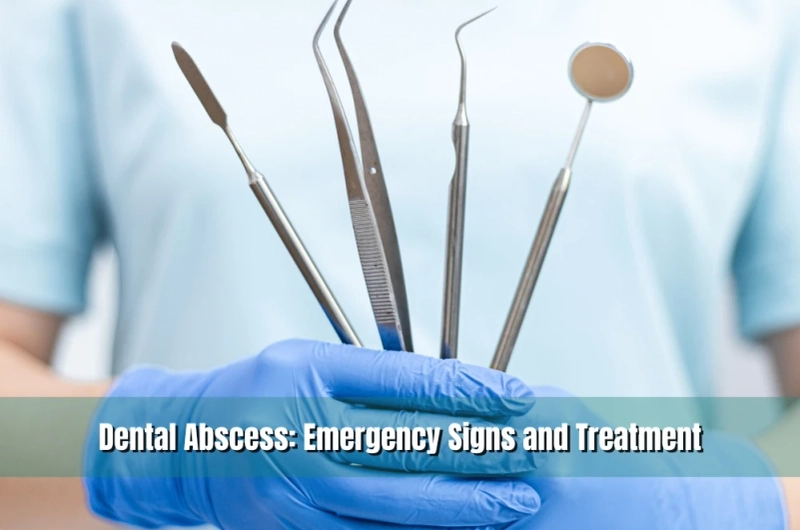The sudden burning shock travels all over your mouth, and the burning travels down your jaw. You are experiencing swelling, and you barely swallow. They are not regular dental issues; they are signs of a potentially life-threatening condition occurring. In our day-to-day lives, dental emergency scenarios always catch us by surprise and leave us shocked with lots of fear. The awareness of how to recognise and manage such emergencies continues to save our teeth from further complications or damage. In case of sudden dental pain, recognising an emergency and acting appropriately is the only action you can take to take care of yourself. Emergency treatment, if necessary, has access to dental emergency care as an innovation, with immediate treatment and relief. This book guides you through dental emergencies such as abscesses, presenting facts so you can go for immediate treatment and pain relief.
What is emergency dental care?
Defining a dental emergency.
A dental emergency can result in access to immediate care. A dental emergency requires immediate treatment for unbearable pain or to prevent further damage. It's only a little more than a run-of-the-mill toothache; it's when the state of your mouth determines your mood. Time is of the essence since delay may complicate infection and tooth loss, thus the urgency. Acknowledging these signs puts you in a position to gain the treatment needed and prevent future problems. Terrible, constant toothache, which renders you unable to work.
- Uncontrollable gum or mouth bleeding.
- Severe face swelling that prevents breathing or swallowing.
- Trauma to the face or tooth, resulting in broken or displaced teeth.
- Abscesses with signs of spreading infection, i.e., fever or malaise.
- Any situation that is extremely painful and affects your lifestyle.
Treat these conditions early to prevent complications and maintain optimal dental health.
Common dental emergencies and how to handle them
Severe toothache.
Toothaches hurt, and they may indicate a severe condition that should be treated immediately. Attempt home remedies first before doing anything else to alleviate the pain, but never neglect to visit a professional. Gargle with salt water to decrease swelling. Place an ice pack on your cheek to numb it.
Knocked-out tooth.
To give an extracted tooth the best chance of survival, it must be handled immediately. To avoid hurting its vulnerable parts, handle it delicately by the crown, never the root. To remove dirt, gently rinse it in milk or a salt solution for a few seconds. If possible, replace it in its natural socket. Otherwise, place it in milk or a salt solution so cells are not destroyed.
Broken or fractured tooth.
Broken and cracked teeth are painful and infective. If treated immediately, they will prevent further damage. Rinse your mouth with warm water. Use a cold compress to minimise swelling. Cover sharp edges with dental wax or sugar-free chewing gum to avoid injury.
Abscesses and infections.
Dental abscesses are serious infections that will spread unless treated simultaneously. These have been found to require an urgent check-up so that complications don't become very serious. The signs are throbbing pain, swelling, and fever, indicating the infection is spreading. Rinse mouth with warm salt water to reduce swelling. Get an immediate dental visit for professional care since abscesses require drainage and antibiotics to kill the infection.
Lost filling or crown.
Losing a crown or filling may expose your tooth's sensitive inner layers to pain and further damage. A few emergency actions can provide temporary relief until you see a dentist. Place sugarless gum or dental wax into the cavity to buffer the tooth and provide temporary relief. Chew on the opposite side to avoid further injury.
Pain management: Immediate relief
Stimulated pain relief after emergency dental care is occasionally required to treat dental emergencies until professional care can be scheduled. Relief can be stimulated at home to alleviate pain until one can see the dentist. Saltwater rinses warm and relaxes the swelling, further cleaning the area. Cold compresses anesthetise the area and decrease swelling.
If you have chronic or severe pain or other signs, such as swelling, fever, or difficulty swallowing, you must visit a professional immediately. These are indicators of a dangerous condition that must be treated quickly to prevent complications.
When to go to the emergency room vs. the dentist
Affordable emergency dental care: Options and resources
Keeping dental care affordable is essential, especially when it is urgent. Several alternatives may help manage the cost and enable you to access the required treatment. Community dental clinics offer low-cost therapies to patients with limited means. Several charities also provide dental care and offer free or low-cost treatment to deserving clients.
- Lower-cost community dental clinics.
- Split-the-fee payment plans charge lower costs for care.
- Charitable care programs provide dental care.
- Public dental care is provided by state and territory governments.
- Student-supervised, student-provided low-cost dental care at dental schools.
- Government financial assistance programs for dental care.
Shopping among these options allows you to receive lower-cost care and the care you need.
What to expect during an emergency dental appointment
Understanding what you experience during an emergency dentist visit will relieve tension and prepare you for the session.
An appointment for a complete checkup is when the dentist sees the problem and prescribes treatment. They can also perform an X-ray to understand the situation better. Antibiotics can be given to fight infection, the abscess can be drained to reduce pressure, and tooth extraction can be performed when necessary. Follow-up will prevent recurrence and ensure proper healing, maintaining your oral status.
Preventing future dental emergencies
Preventing dental emergencies is optimal for maintaining a healthy, pain-free smile. Regular oral care can prevent most dental issues—brush and floss daily to remove plaque and bacteria. Your dentist can catch problems early on and offer preventative treatment with periodic dental check-ups. Regular dental examinations are essential for maintaining oral health.
- Brush and floss every day to remove plaque and bacteria.
- Periodic dental check-ups to catch problems early.
- Wear mouthguards during sports activity to prevent injury to your teeth.
- Healthy diet to maintain healthy teeth.
- Stop clenching and grinding behaviours.
- Professional cleaning at regular intervals.
Following these habits can make all the difference in preventing the likelihood of a dental emergency and preserving your smile.
Conclusion
Dental emergencies, especially abscesses, need to be addressed promptly to prevent serious complications and for your overall well-being. Knowing when to seek assistance and which treatments are appropriate is essential in handling such a case effectively. Practice prevention by keeping your mouth clean and regular visits to the dentist now and then in a bid to preserve your smile. Don't be afraid to use emergency treatment when needed because obtaining an instant treatment will prevent permanent damage, and your health will be assured.


